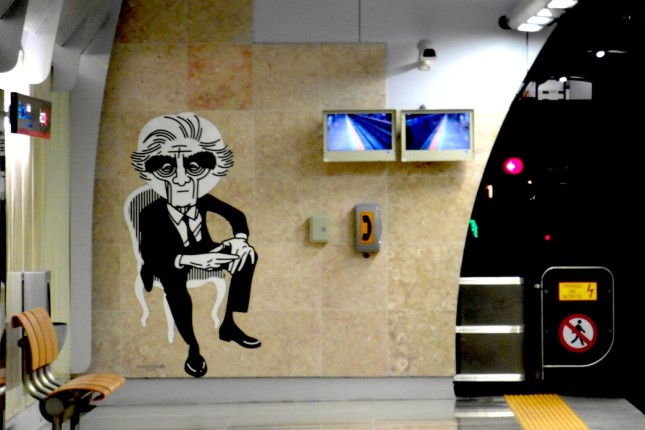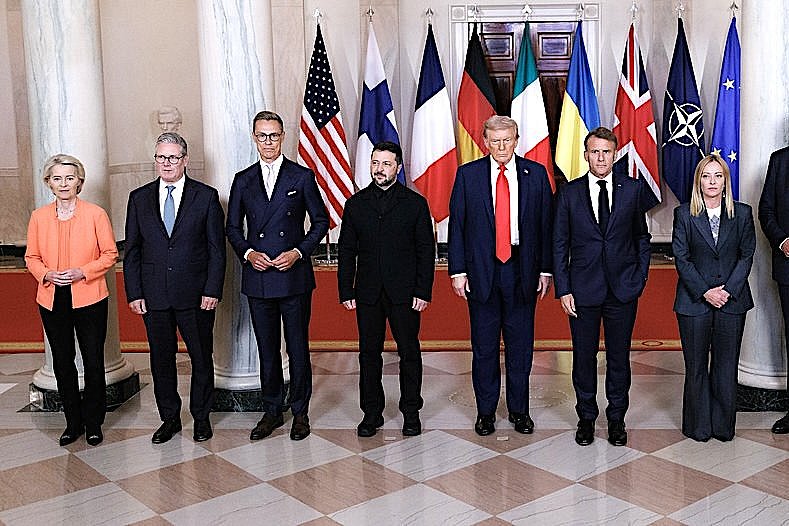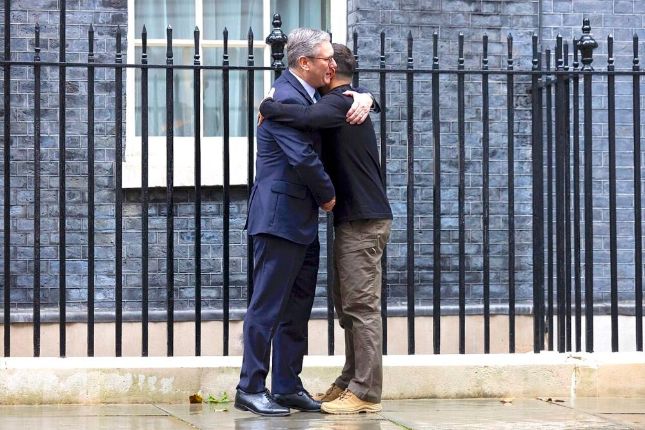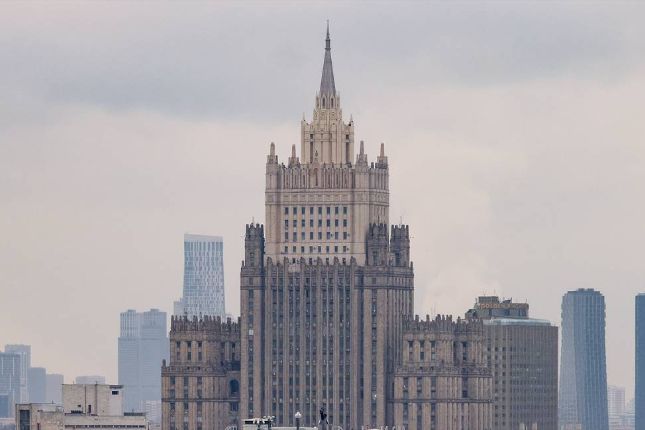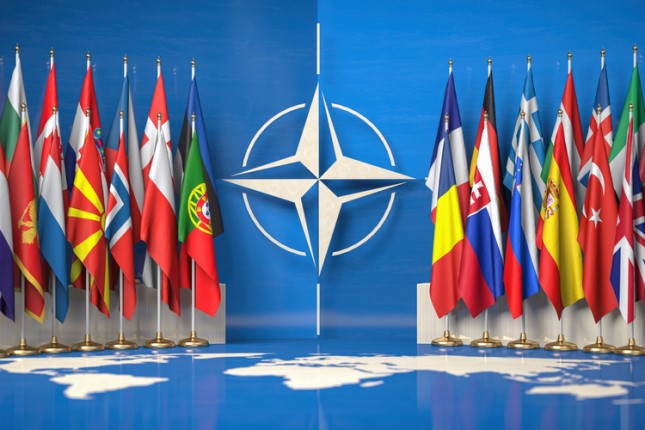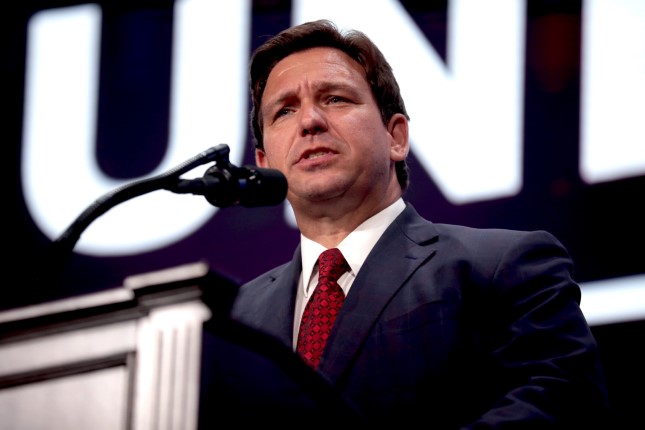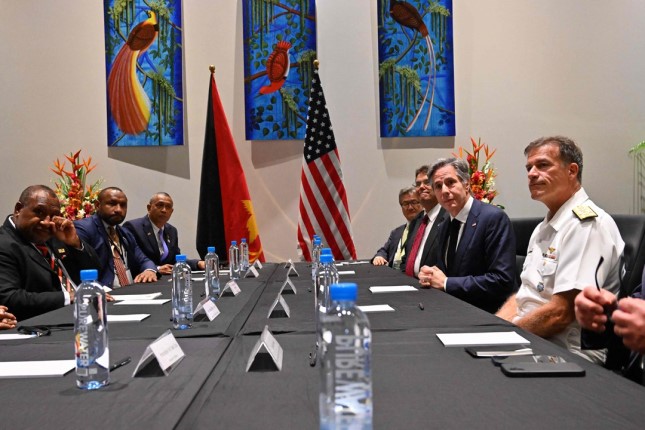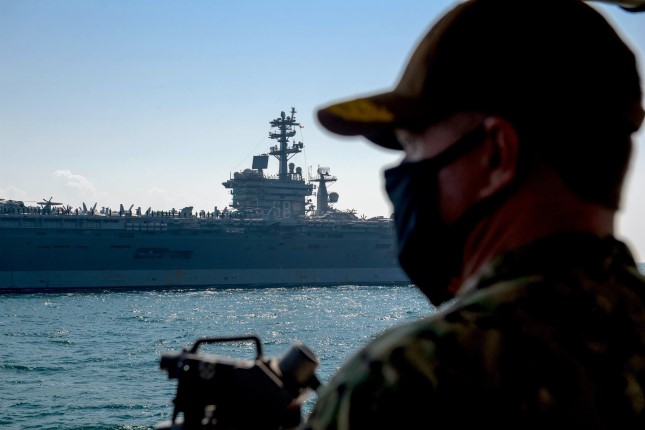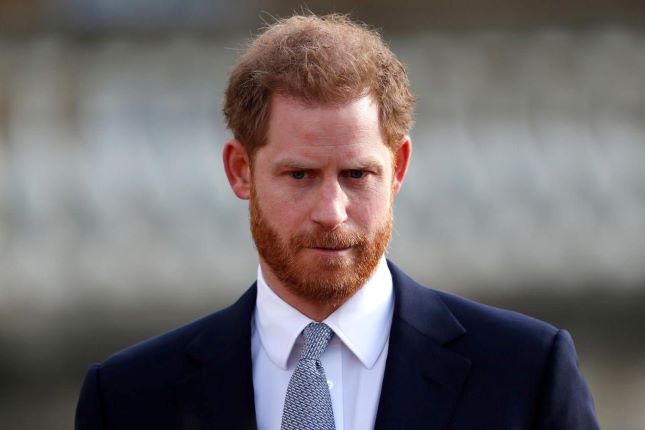To know the [U.S.] Guardian’s history was to recognize it among the remarkable endeavors of twentieth-century journalism. Cedric Belfrage and James Aronson, an expatriate Englishman and an American, conceived of an independent newspaper, immune from the corruptions they knew well, while serving in occupied Germany.
The two were assigned to de–Nazify the press and rebuild a newspaper culture suited to a newly democratic nation — “journalism run by journalists,” as Aronson put it. The paper Belfrage and Aronson eventually published back in America came out in support of the presidential campaign of Henry Wallace, who ran against Truman in 1948 on a Progressive Party ticket. But party affiliation was pointedly not the point. Sound journalism was the point….
By 1948, the anti-Communist folie Américaine was spreading like kudzu across the landscape. Of official harassment there would be plenty in the years to come, … but Belfrage and Aronson had struck a vein.
In a way good historians would be first to understand, they had brought to the surface a counter-tradition in journalism that was as old and as American as the republic…. In time, the National Guardian’s contributors included an extraordinary gathering of political, cultural, and literary figures, among them [Arthur] Miller, Norman Mailer, W. E. B. Du Bois, Sean O’Casey, William Appleman Williams, Eugene Genovese, Staughton Lynd, Maxwell Geismar, Tom Hayden, and Wilfred Burchett, a well-traveled correspondent who was to cover the world’s biggest stories for the next three and some decades.
What green aspirant wouldn’t want to add his byline to such an assembly — literate, politically engaged, above all dedicated to a journalism of integrity? The appeal moved fewer as the years went on, in truth. National Guardian pay was lean and the life precarious. By the 1950s most journalists were professionalized in the way I have previously used this term.
Dreams of status at the elite end of the middle class and a life inside the tent rather than beyond it nearly always extinguished the flame burning within many newcomers to the craft. I still find it remarkable — and difficult to explain to those not in newspapers — how second-home mortgages, school bills, BMWs and European holidays can determine the way the most momentous world events are reported.
I resisted when my time came. As I stepped off the elevator at 33 West Seventeenth Street, I stepped into something of a floating world, as the Japanese would call it. Independent media then were in the way of transient, uncertain, struggling for stability, the best of them nonetheless thoughtful and fully alive to the world in which we lived….
The National Guardian’s circulation reached 76,000 by the end of its second year, a measure of the peaceable postwar mood. Then the Cold War inquisition began to exact its toll and the strong momentum was interrupted.
The New Left
Cedric Belfrage, not yet naturalized, was deported in 1955, having testified uncooperatively before McCarthy’s Senate subcommittee two years earlier. This left Jim Aronson to run the newsroom. He did so for 12 more years. At that point it wasn’t Cold Warriors or F.B.I. informants (of which more than a few) who dealt the paper a critical blow. The New Left was by then dividing itself into “fissions without end,” as Belfrage put it later. The National Guardian soon had a case of this wasteful madness.
The transformation of some of the National Guardian’s staff into sophomoric dreamers with just enough history in their heads to miss its meaning entirely was evident by the mid-sixties. They made the not-uncommon mistake of confusing journalism and activism. Aronson and Belfrage, “editor-in-exile” since he settled in Mexico, were effectively ousted. They submitted their resignations on the same day in April 1967.
The National Guardian, “the progressive newsweekly,” became the Guardian, “independent radical newsweekly.” In the years that followed, the lapse of the left into a Surreal sectarianism grew ever further from reality. To anyone gazing into those large loft windows the newsroom would have seemed like some sort of snow globe scene — silent, hermetic, distant, wholly other.
The legacy Belfrage and Aronson left behind still lingered in the air with all the dust as I marked my proofs. I shared with a number of others a professional regard for what an independent press could accomplish in the name of the paper’s ideals, although we understood that Belfrage and Aronson’s New Deal-ish sensibilities no longer suited our time.
In the course of things Cedric and I became friends by mail, he still resident in Cuernavaca. I sent him a copy of The American Inquisition, his just-published book on the McCarthy period, and he returned it signed with a note. “Yes, I still get the Guardian,” it reads, “but I see no future for ideological virgins, and am bored by the struggle among Marxist–Leninist sects while Rome burns around us.” I drew comfort from this distant friend and his “fraternal abrazo.”
One day as I sat at the proofing desk, Jack [the late Jack Smith, editor at this time] asked me to pick up my extension and take dictation. It was a bright spring morning, and the sun streamed onto my pages through one of the east-facing windows. The call was from Wilfred Burchett, who I knew only by name and reputation. He had distinguished himself many times over since covering World War II, most recently as the only Western correspondent to report the Vietnam War from the North. He did so on a bicycle in áo bà ba, what we insist on calling “black pajamas.”
Portugal’s Revolution of Carnations
Wilfred was calling from Lisbon this time. Portugal had had its Revolution of Carnations in April 1974, when army officers serving in the failing African colonies returned to topple Marcelo Caetano’s dilapidated dictatorship, then a half-century old.
A year later Wilfred was covering the pitched political battles that would set the nation’s new course. There was talk — wildly overblown per Cold War custom — of a Soviet foothold in southern Europe. This was Wilfred, there at whatever “there” was running on page one.
He was a genial, earthy Australian, cultured but with no shred of pretense about him. I still recall that first collaboration by telephone. I knew instantly there was a professional, in the better meaning of the term, at the other end of the line. Wilfred read in his worn-smooth accent, slowly enough for me to keep pace at the typewriter. He had a singular way with proper names.
Melo Antunes (theoretician of the Captains’ Coup, as the military overthrow was also called) came out “Meeehllloooh Aaanntuuunneeehjjj” in lilting cadences. Vasco Gonçalves (another officer and premier in the first provisional government) arrived in my headphones as “Vaaahssscoooh Gonnsaaahlllveeehjjj.” Wilfred must have acquired this considerate habit over the course of a thousand telephone dictations.
I didn’t edit Wilfred’s Lisbon file. I neatened up my typed pages, walked them over to Jack, and returned to my proofing. There are rare occasions in fortunately lived young lives when one is visited by a premonition of things to come, the path out front illuminated. So it seems to have been that morning. I knew then I was to live my life, or a good part of it, as a correspondent abroad. Wilfred was shortly to leave Lisbon. My quiet epiphany: I don’t know how else to explain the determination, unmarked by doubt, that drove me from that day forward to follow the route he had opened to me — in the first instance literally.
Everything now turned to my new plan. At The News [the New York Daily News, my first employer], I spent long hours in the morgue [the clipping library] photocopying years of Portugal coverage in all the major dailies…. I had my Royal Speed King, a hand-me-down from my father, cleaned and re-ribboned. Jack agreed to write letters of accreditation, essential equipment for any arriving correspondent.
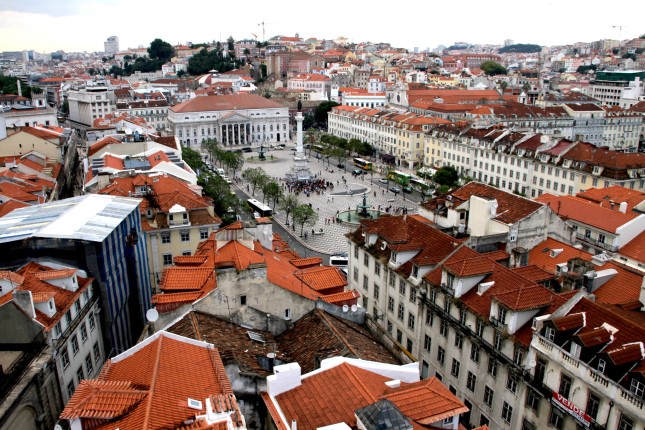
Lisbon from Elevador de Santa Justa, 2012. Photo: Gerd Eichmann / Wikimedia Commons / CC BY-SA 4.0.
In the late spring of 1975, I resigned from The News, stuffed a suitcase with clothes and clippings, said goodbye to my beloved, and flew to Paris. Life took on the look of those bright, beckoning flowerbeds in the Jardin des Tuileries.
It never takes much to get me to pass through Paris, but there was purpose in my stop this time. Wilfred lived with his wife, Vessa, and their children in Meudon, a western suburb halfway between Paris and Versailles. I knew he wouldn’t be there: Jack had told me he was on his way to cover the post-independence conflict in Angola, where another Cold War confrontation had ignited. But Wilfred had written the first of what turned out to be two Portugal books in no time, as was his gift. The Captains’ Coup hadn’t yet been published, but the typescript was in Meudon: Could I ask for a better primer explaining the stormy political sea I was about to plunge into?
I checked into l’Hôtel de l’Université, my Latin Quarter standby, and telephoned Mme. Burchett to see about the book. She greeted me with the wary frost I had fully anticipated. It is the only copy, she replied when I proposed spending a few days making notes on Wilfred’s text. She wasn’t sure Wilfred would approve. It was unwise, she pondered, to let the typescript out of the house. Finally: Could I telephone again tomorrow? I was sure she would call New York to see about this out-of-nowhere fellow and his importunate request.
Jack must’ve done the necessary. I took the train from the Gare Montparnasse the next morning, and on my arrival Vessa greeted me in the front garden with the typescript. I returned to Paris and spent the next few days at café tables filling several schoolboy’s cahiers with what, when done, was a fulsome summary of Wilfred’s book. When I brought it back, Vessa offered a sparing smile. On the return train to Paris, I reflected that it was large and decent of Wilfred’s wife, with an eyebrow rightfully arched, to trust me as she had. This was another of the Cold War’s small corners: It draped blankets of doubt over otherwise ordinary encounters. Nothing, as Arthur Miller had foretold, was necessarily as it seemed.
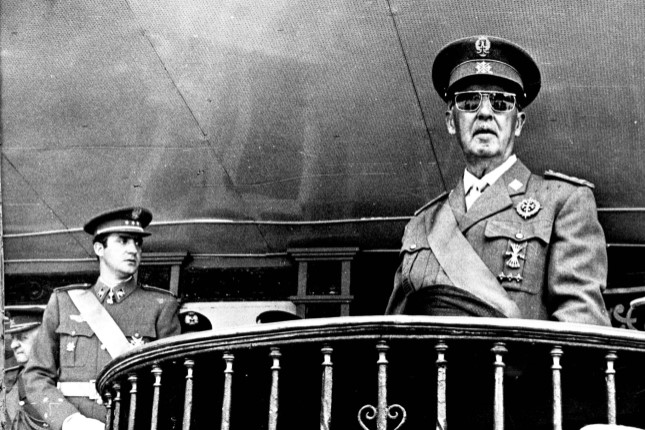
General Francisco Franco, at right, with Spain’s Prince Juan Carlos in 1969. Photo: Anefo / Wikimedia Commons / CC0.
I crossed Spain during what turned out to be the Franco regime’s final months. A more downcast people I had never seen as my train, a cheap local, stopped in more stations than I could count. At each, Guardias Civiles with machine guns boarded briefly to walk the aisles, heads swiveling from side to side. Another bitter taste of the Cold War: This was my first glimpse of a dictatorship Washington counted an ally, the Falangist Franco having won its approval when, decades earlier, he took down the Spanish Republic. I learned quickly from the other passengers to keep my gaze averted and peel my oranges in silence.
Crossing into Portugal at Vilar Formoso and training through Coimbra, the celebrated university town, I was a stranger arriving at a boisterous party. The decades under António Salazar and then Caetano had left Lisbon looking like something out of a García Márquez novel — a fin de siècle backwater smothered in saudade and Iberian Catholicism.
But dozens of political parties and movimentos had sprouted like spring flowers in the year since the revolution — so many I kept a list with notes as to the persuasions of each. A collective embrace of unfamiliar freedoms gave the effect of Jack springing out of his box. The Rossio, beating heart of the capital, was crowded with stalls offering everything from pornography to party banners on sticks to a vast variety of well– and badly done newspapers fighting their political corners on each página um. The political chatter began at sunrise and went on well into the evening.
Near Total Uncertaint
Lisbon was my classroom…. All was improvisation, nothing of the nation’s future decided. As I made my way around the country, the state of near-total uncertainty I found seemed to me a rare and salutary interim. So fundamental a condition rendered people acutely alive. A kind of power falls to those courageous enough to accept that their future remains to be determined and lies in their hands. I, too, found a vitality in the life around me I have seldom known since.
But what the Portuguese called the verão quente, the hot summer, was soon upon us. There was a rightist coup attempt against the Gonçalves government in the spring. When it failed the Socialists started a destabilizing campaign of demonstrations against “Vasco, Vasco, companheiro,” as the prime minister’s loyal supporters shouted at their gatherings.
Another coup attempt, known as 25 de Novembro for its date, would make the point plain: Portugal had scores of political formations but one choice. It was to make itself some latter-day version of the Spanish Republic or turn right as it made its way out of the decades of dictatorship.
The decisive figures were Álvaro Cunhal, the stoically charismatic leader of the PCP, the Portuguese Communist Party, and Mario Soáres, whose Socialists were much given to accredited membership in the Western alliance. It was not difficult to discern the Cold War as it arrived, or to see it in the American press coverage of these events.
The PCP’s prominence at the time cannot be overstated, though it is important to understand what it was and was not.
Having endured clandestinely for decades, it emerged in 1974 a disciplined “wall of steel,” as members and supporters described it. The party was everywhere, the work of many underground comrades over many years. I laughed aloud when, during a weekend by the ocean south of Lisbon, I spotted PCP beach balls and umbrellas in the party’s red and yellow colors. It was especially strong in Alentejo, the broad, flat region southeast of Lisbon, where peasants lived in poor villages next to large latifundia whose absentee owners used them to hunt once or twice a year. On an estate villagers had taken over, one of many, earnest teenagers tilled hectares of tomatoes and beans with translations of Marx in their back pockets. At the edge of a field, a recently arrived Soviet tractor glinted in the sun.
Cunhal appeared the very picture of a Stalinist strongman. Lean, silver-haired, handsome in the chiseled-features way, he had a lot of prison time on his face by the time he took the PCP above ground in 1974. Contrary to the clichéd caricatures in the Western press, I detected a subtle but palpable humanity behind the taciturn demeanor.
His loyalty to Moscow lay beyond question, but this was a remnant of his younger years, as I read it, and the sentiment of a figure who had never held power. Eurocommunist leaders were then emerging in Spain, France and Italy — three Latin nations, or in France’s case partly Latin. In my estimation, Cunhal would have taken his place among them had the formidable apparatus behind him carried the PCP to power.
The Portugal I saw and reported was struggling to become a nation of its own making — neither Moscow’s nor Washington’s. Its people had come through the revolution with uplifted eyes, their legible preferences running to nonalignment and one or another kind of social democracy. But this was not to be. The political impasse seemed to invite a covert C.I.A. operation, and the agency accepted as was its well-established wont. Firsthand now, I watched as Washington made another nation one of its experiments in altered reality and as the American press played POLO [“the power of leaving out”] with abandon.
Reports of CIA Presence
Reports of the C.I.A.’s presence began to see print within a few months of the 25th April revolution. The newly enlivened Lisbon dailies were dense with such stories. That autumn, 1974, The Associated Press reported that the agency had a hundred operatives on the ground. We now know the Ford administration fully intended to intervene to block a NATO member’s leftward drift. The question was how to get this done.
Henry Kissinger, then Ford’s secretary of state, favored an alliance with extreme-right political parties and a military intervention — effectively a repeat of the Chilean coup two years earlier. Frank Carlucci, the new ambassador to Lisbon, argued for a covert political operation aimed at the opportunist middle — those to the right of the PCP but to the left of the arch-conservative parties. Carlucci won Kissinger over, and his strategy, when realized, bore striking resemblance to the C.I.A.’s subversion of Italy’s elections in behalf of Christian Democrats in 1948 (and for many years afterward).
Carlucci was no stranger to clandestine interventions. Within days of his arrival in January 1975, he settled on Soáres, identified by this time as a political main-chancer, as the principal channel through which he would manage his operation. This amounted to a money-funneling scheme focused on ranking army officers, center-right and center-left political parties, the press, and some elements in the highly influential Catholic Church. Carlucci’s operation was covert only in its finer details.
It was prima facie plain since his appointment, which was front-page news in Lisbon, that Washington had made Portugal another of its Cold War theaters. The Portuguese were incensed by this intrusion into their post-revolutionary affairs. Demonstrations in front of the American Embassy and Carlucci’s residence were so frequent the government — reluctantly at first — sent troops to protect them. Things nonetheless went Washington’s way soon enough. Soáres took office as premier six months after the hot summer drew to a close.
These events, by way of declassified documents, scholarly research, interviews, and oral histories, are now a matter of record. What struck me as I covered them was how aware Portuguese were of what was unfolding around them and how plainly they were able to speak and write of it. It was like listening to a new political language — clear, to the point, no cotton wool to it.
Americans — and how could I fail to notice? — read nothing of Washington’s machinations in Lisbon, nothing of Carlucci’s intervention. I was face to face with the ideological contaminations of American correspondents abroad. I found The New York Times coverage especially dishonest by way of its fractionally accurate reports and frequent omissions, notably those concerning Carlucci’s operation, the realities of which were perfectly available to anyone with open eyes and ears…. This was brazen malpractice — my estimation then and now.
I took instruction in these and other such matters during my time in Portugal. All correspondents bring their politics with them — a natural thing, a good thing, an affirmation of their engaged, civic selves not at all to be regretted. The task is to manage your politics in accord with your professional responsibilities, the unique place correspondents occupy in public space.
There could be no confusing journalism and activism, as I had seen on West Seventeenth Street. While we commonly associate this error with independent publications, let us be clear: Every mainstream journalist serving the national security state is guilty of it — every one an activist. It requires discipline and ordered priorities to get this question right. Learning these was a project of mine at this early moment in my professional life. I count this point as important now as I did then.
I had also learned by this time to dispose of the Manichean Cold War prejudices drilled into every American born at midcentury or later — another lesson I have ever since valued. A tractor donated as foreign aid needn’t be understood as anything more than a tractor unless there is evidence otherwise, in the way a cigar is more often than not just a cigar.
It was a correspondent’s place to report as truthfully as he or she could on the doings of others, whether or not one approved. Marvine Howe, the Times’ gritty, seasoned correspondent in Lisbon at the time and long controversial for her proximity to the powers she reported on when these powers were conservative, would have rung the “Red menace” bell loudly had she set eyes on that tractor in Alentejo. Marvine was an activist. During the verão quente and the crucial months that followed, I will add, it was widely understood among other correspondents that she was — how to put it? —inappropriately close to Soáres as he collaborated with Carlucci. One was not altogether surprised.
Portugal was formative to the beginner I was then. It was a first attempt to report and write as the correspondent I aspired to be — filing to an independent press, holding to professional standards others around me had vacated. In the personal terms I choose, for a brief time my shadow and I were one, integrated and whole. As I made my way home, a thousand lessons crammed into a Portuguese army backpack I picked up in a surplus shop, I knew I was about to learn another: I would see more clearly than ever the darkness within which the American press confined American readers.
I paused in Toulouse en route back to Paris for my flight home. A kindly Toulousain of a certain age took me to see the large fields outside the city where Spanish refugees had taken shelter after fleeing the Franco regime 40 years earlier.
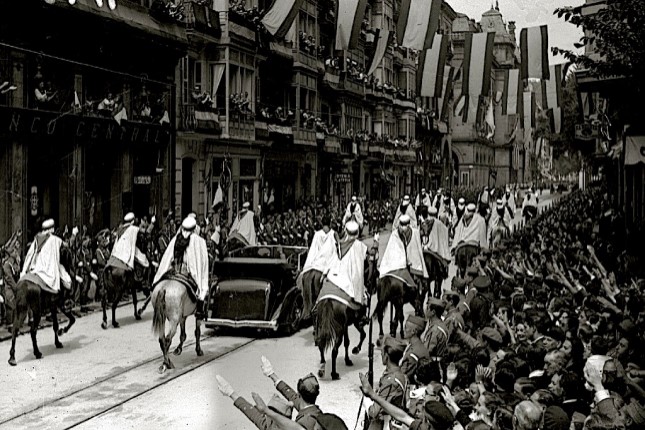
Franco arriving in San Sebastian in 1939. Photo: Pascual Marín / Wikimedia Commons / CC BY-SA 3.0.
Half a million Spaniards had fled to grim, improvised camps on the French side of the Pyrénées and along the Atlantic coast. This was called la Retirada, the Retreat. It was my first glimpse, in its early stage, of the ideological confrontation that marked the 20th century.
In those fields — ghostly fields, as the old man told of them, haunted fields — I saw in the mind’s eye the human cost of it. For many of those refugees there was no going back. I thought of my journey to Lisbon, of how the train from Paris was filled with Portuguese maids and manual laborers the dictatorship had dispossessed. Would they have a country of their own now?
How many American correspondents would even understand such a question? Martha Gellhorn once described journalism as an honorable exchange between reporter and reader. Where lay the honor now? How many correspondents knew even to ask?
Main photo: Cartoon of the Portuguese writer and politician Álvaro Cunhal at Aeroporto metro station, Lisbon, Portugal, 2012 © IngolfBLN / Wikimedia Commons / CC BY-SA 2.0.
Source: Consortium News.
